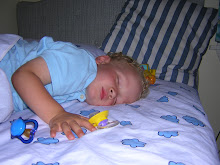One of our alert readers directed us to this article on the virtues of co-sleeping especially when breastfeeding. And we say: if it works for you, then go for it. Just please, please, please follow the basic rules that we outlined earlier: no gap between the headboard and mattress; no excess of bedding; no exceedingly soft surfaces; baby positioned to sleep on her back.
Another thing with all of the recommendations that Denise and I make here: if you don't view sleep as an issue, then it's not an issue. So, if you, your bedpartner and your child are all comfortable and are not experiencing daytime fatigue and all feel that the amount of sleep that each of you is getting is adequate, then you don't have a problem. If you have a problem (frequent awakenings during the night unrelated to feeding an infant; excessive daytime sleepiness; infant with slow growth), then the co-sleeping situation should be examined to see if changing it changes the issues.
As opposed to Gisele Bundchen dictated that all mothers should always breastfeed their babies for at least a year and every mom who either failed at breastfeeding or returned to a job outside of the home freaked out, we, the Sleep Tech Moms, recognize that there is a unique solution for sleep for every family and that there are as many iterations of sleeping as there are families. And while, as sleep techs, we are always prepared to glue wires all over the head of anyone who sits still long enough for us to do so, we are aware that the sterile environment of the lab is not necessarily how people sleep in their homes.
So there.
Songs of Innocence & Experience
6 years ago



